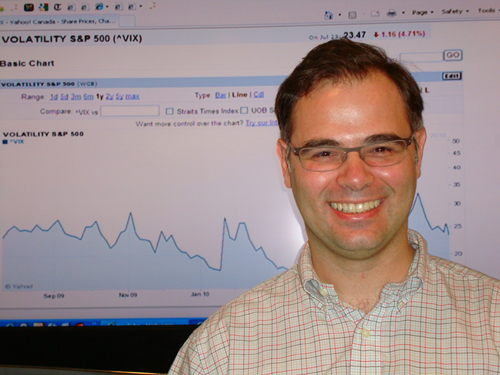
For some, it’s because they’re fascinated by money. For others, it may be just a love of math. But Ilias Tsiakas knows exactly why he’s attracted to the world of high finance: “I like precision.” The newly appointed economics professor adds: “I like important ideas that you can write down and express in a precise way. That’s why I decided to study finance and economics.”
His enthusiasm for the gathering and analysis of data has led Tsiakas to focus his research on the foreign exchange market, which determines the relative values of different national currencies. “It’s the biggest market in the world,” he says, operating to benefit international trade and investment by allowing businesses to convert one currency to another. “There are more than $3 trillion (12 zeros) traded in foreign exchange every single day.”
Tsiakas grew up in Greece but returned to Canada, where he was born, to attend university. After graduating from the University of Toronto with a PhD, he took a position at the Warwick Business School at the United Kingdom’s University of Warwick. There he continued his research in financial econometrics.
Because econometrics is an unfamiliar word to many of us, Tsiakas explains that this means using statistical methods and models to estimate volatility and correlations between the returns of financial assets. It sounds complicated ─ and it is ─ but he provides some examples to help explain his work. Start with the loonie. Most Canadians are familiar with the changing exchange rates between the U.S. dollar and the Canadian dollar. Sometimes the U.S. dollar is much higher, sometimes the Canadian dollar catches up or even squeaks ahead. Tsiakas says the amount of change seen is called “volatility.” Big jumps mean high volatility; the small changes we usually see are low volatility.
Financial traders can actually trade on their estimates of future volatility through “volatility swaps.” Tsiakas explains that a trader will predict the future volatility of an exchange rate and speculate on that by purchasing a “swap.” Guess wrong, and you can lose money. Guess right, and you’ll make a profit.
With his love of precision, Tsiakas isn’t satisfied with guesses. His research shows how statistical analysis can lead to better, more accurate predictions about volatility changes. This information is helpful to traders investing in volatility swaps. “Our work is used by banks, people who do investments and people who develop portfolios,” says Tsiakas. “It’s serious academic research, but it’s not abstract. It has immediate application in the financial world as well.”
The first published paper on this work earned Tsiakas and his co-researchers a prestigious award from INQUIRE UK ( Institute for Quantitative Investment Research) for producing the best research paper in 2010.
This particular field, Tsiakas adds, has seen tremendous growth in the past 10 years in terms of research. “That means there are a lot of resources, and it’s been an exciting area to work in.” Equally exciting, he says, is the opportunity to teach at the University of Guelph. “I love to teach. It breaks the monotony of research, and you get a chance to clarify your thoughts as you explain them. Research is what gets all the attention, but I believe academics also need to be good colleagues and good teachers.”